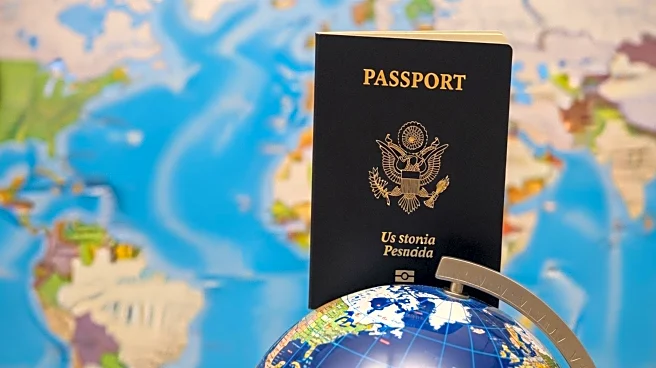What's Happening?
The U.S. passport has fallen out of the top 10 most powerful passports globally for the first time in 20 years, according to the latest Henley Passport Index. This index ranks nations based on the number of destinations a traveler can visit without needing
a visa. The U.S. passport is now ranked 12th, tied with Malaysia, having dropped from seventh place last year and 10th place in July. A decade ago, the U.S. passport was at the top of the index. Christian H. Kaelin, chairman of Henley & Partners, noted that the decline reflects a fundamental shift in global mobility and soft power dynamics. The U.S. passport downgrade coincides with the Trump administration's immigration policies, which have expanded from targeting illegal migration to scrutinizing travelers on tourism, work, or student visas. Several countries, including Brazil, China, and Vietnam, have recently removed visa-free travel for U.S. nationals.
Why It's Important?
The decline in the U.S. passport's power is significant as it reflects broader geopolitical shifts and the impact of U.S. foreign policy. The reduction in visa-free access for U.S. travelers may affect international business, tourism, and cultural exchanges, potentially leading to decreased economic activity and diplomatic engagement. Countries that prioritize openness and cooperation are gaining influence, while those perceived as isolationist, like the U.S., are experiencing a decline in global mobility. This trend could influence international relations and the U.S.'s ability to negotiate favorable terms in global agreements.
What's Next?
The U.S. may need to reassess its visa policies and diplomatic strategies to regain its passport power. This could involve negotiating reciprocal visa agreements with other nations or revising immigration policies to enhance international cooperation. Stakeholders, including policymakers and businesses, may push for changes to improve the U.S.'s global standing and facilitate easier international travel for Americans. The ongoing shifts in passport rankings could also prompt other countries to reevaluate their visa policies in response to changing global dynamics.
Beyond the Headlines
The decline in passport power may have cultural implications, affecting how Americans perceive their country's role in the world. It could lead to increased introspection about national identity and the balance between security and openness. Additionally, the shift may influence long-term trends in global mobility, as countries that embrace international cooperation continue to rise in influence, potentially reshaping global travel norms and expectations.


















